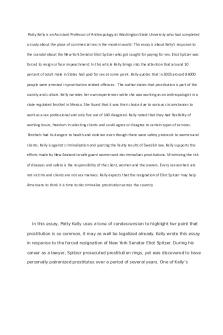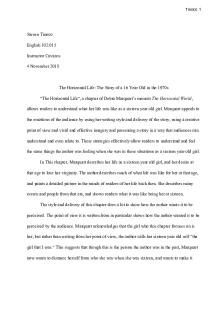Rhetorical Analysis: about your life PDF

| Title | Rhetorical Analysis: about your life |
|---|---|
| Author | Chana Steven |
| Course | History Of English Language |
| Institution | University of Texas at Austin |
| Pages | 4 |
| File Size | 65.1 KB |
| File Type | |
| Total Downloads | 24 |
| Total Views | 119 |
Summary
This is a essay about your life as a college student and what you can improve on as a person in English and all of your other classes...
Description
Rhetorical Analysis
Junk food is, without a doubt, a huge factor in the battle against obesity among many people. A part of the population of the United States There is no denying that "junk food" is viewed negatively. Obesity is caused by a variety of factors. It is common knowledge that the more sugary and fatty foods you consume the more fat you get. David H. Freedman states in the passage "How Junk Food Can End Obesity" that cutting back on how much fast food and junk food people consume can make a huge difference. Freedman makes a convincing case that junk food reduces the risk of obesity by using the rhetorical tactics and persuasive appeals of exemplification, paradox, and logos to persuade the reader that his claim is exceptional. Freedman discredits what most people believe to be a safe alternative to "junk food" at the beginning of his article. Freedman reflects on the concept that even if something seems to be good for your wellbeing, that is not always the case. These people are being duped into purchasing "wholesome" foods that appear to be good for your health when, in fact, they have the same detrimental effects on your body as "junk food." Freedman stated “many of the dishes glorified by the wholesome-food movement are, in any case, as caloric and obesogenic as anything served in a Burger King” (Freedman 906). These foods are not only just as unhealthy, but they are also significantly more expensive and take significantly longer to prepare. Freedman challenges the reader to understand how he or she determines whether the food they are consuming is safe for them. Quick food restaurants are a major focus of Freedman's post. Why wouldn't he, given that we, the consumers, are major stakeholders in this industry? Fast food chains such as McDonald's and Burger King are often criticized for obesity in the United States.
Everyone is pointing their finger in their direction. As shown in a Cornell University Food and Brand Laboratory study, fast food does not seem to only be a major cause of obesity in the United States. On the contrary, experts say that the general eating habits of the American people should be blamed, especially the amount of food eaten. According to experts, such reports do not allow people to eat fast food. “Simply put, just because those things can lead you to get fat doesn’t mean that’s what is making us fat,” says Just. “By targeting just these vilified foods, we are creating policies that are not just highly ineffective but may be self-defeating as it distracts from the real underlying causes of obesity” (Just). These fast-food restaurants are popular among Americans because they serve delicious food in a short amount of time. These restaurants are supposed to serve low-cost meals to the public. These fast foods are almost addictive in the sense that they make people feel good and make people want more. “We can all agree that many obese people find the former foods extremely enjoyable and seem unable to control their consumption of them" Freedman writes (909). Moreover, for almost all people who work at minimum wage, they can afford it, which makes them very attractive to the poverty-stricken. Freedman claims “that person is relatively poor, does not read The Times or cookbook manifestos, is surrounded by people who eat junk food and are themselves obese, and stands a good chance of living in a food desert- an area where produce tends to be hard to find, of poor quality, or expensive” (907). Freedman believes that, on the other hand, fast food restaurants should not be blamed on obesity. Owing to fast food's widespread popularity in the United States, it is reasonable to assume that if the quality of fast food were to increase, the number of obese people in the country would decrease. Everyone enjoys a plain old McDonald's Big Mac or a Burger King Whopper.
Finally, Freedman's essay is based on logic and reason. He candidly admits that unhealthy foods are not everything they are made out to be and insists that eating unhealthy fast food and refined foods will not make you fat. The truth is that nutritious foods are the best. Unhealthy kind that contains a lot of fats and carbs and misleads the public into thinking it is healthy encouraging them to eat a balanced diet even though they were unaware of the higher cost spectrum, In the same way, it is the individual's choice to live a safe or unhealthy lifestyle, as well as the amount of food they consume. Obesity, diabetes, and a variety of other complications are also possible outcomes.
Works Cited:
Freedman, David H. "How Junk Food Can End Obesity." Norton Ebooks. July 2013. Web. Cornell University. "Cornell Study Suggests Soda, Junk Food Not Why We're Fat." Medium. Cornell University, 05 Nov. 2015. Web....
Similar Free PDFs

Rhetorical Analysis
- 5 Pages

Rhetorical analysis
- 2 Pages

Puppy Rhetorical Analysis
- 4 Pages

Rhetorical analysis -1
- 4 Pages

Bowling Dana Rhetorical Analysis
- 4 Pages

Rhetorical Analysis Essay
- 5 Pages

Textual Rhetorical Analysis
- 3 Pages

Rhetorical Analysis Final
- 5 Pages

Rhetorical Analysis Prompt
- 2 Pages

Final Rhetorical Analysis Essay
- 2 Pages

Rhetorical analysis pt1
- 2 Pages
Popular Institutions
- Tinajero National High School - Annex
- Politeknik Caltex Riau
- Yokohama City University
- SGT University
- University of Al-Qadisiyah
- Divine Word College of Vigan
- Techniek College Rotterdam
- Universidade de Santiago
- Universiti Teknologi MARA Cawangan Johor Kampus Pasir Gudang
- Poltekkes Kemenkes Yogyakarta
- Baguio City National High School
- Colegio san marcos
- preparatoria uno
- Centro de Bachillerato Tecnológico Industrial y de Servicios No. 107
- Dalian Maritime University
- Quang Trung Secondary School
- Colegio Tecnológico en Informática
- Corporación Regional de Educación Superior
- Grupo CEDVA
- Dar Al Uloom University
- Centro de Estudios Preuniversitarios de la Universidad Nacional de Ingeniería
- 上智大学
- Aakash International School, Nuna Majara
- San Felipe Neri Catholic School
- Kang Chiao International School - New Taipei City
- Misamis Occidental National High School
- Institución Educativa Escuela Normal Juan Ladrilleros
- Kolehiyo ng Pantukan
- Batanes State College
- Instituto Continental
- Sekolah Menengah Kejuruan Kesehatan Kaltara (Tarakan)
- Colegio de La Inmaculada Concepcion - Cebu




